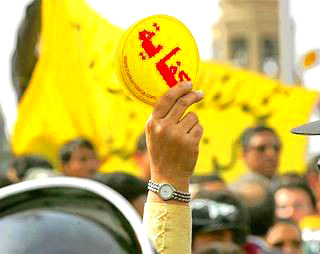
By Andrea Teti, Department of Politics and International Relations, University of Aberdeen
Following a wave of strikes and an equally spectacular tsunami of price increases in a range of essential goods over recent months, the April 8th local elections seemed for a brief moment to have become a focus for Egypt’s diverse opposition. A few days before a general strike proclaimed for April 6th, the coalition for democratic change Kifaya! (Enough!) published a statement saying it expected the Muslim Brotherhood’s active support. In the event, the Brotherhood defended Kifaya!’s right to strike, but did not participate in it. Then, following a wave of pre-election arrests and dirty tricks by the ruling National Democratic Party – resulting in a mere 21 MB candidates making it onto ballots out of the 5,754 put forward – the MB declared the elections beyond repair, and boycotted them. The NDP’s electoral victory (97% of posts) was as striking as the estimated 5% voter participation rate.
Aside from the size of the victory what was interesting was the increasingly apparent isolation of the NDP’s ruling elites; the ‘old guard’ as much as the opposition were a target for the opposition-quashing tactics orchestrated by Gamal Mubarak, dauphin of his father’s presidency, and Egypt’s richest man, Ahmad Ezz.
But more important is the regime’s attitude itself. Opposition voices within Egypt – and those of ordinary people – rail against the government. It blatantly ignores an increasingly desperate plight resulting from the inflation which a combination of global market forces and its ‘liberalisation’ have produced. If a vocal opposition and an angry ‘street’ are impressive, however, even more so is the fact that the regime ignores them. Whether arrogant or confident, its behaviour signals a belief that a mere pandering to façades of democracy and legality are sufficient to ensure continued support of its Western allies. EU and US silence on the hunting ground which Egyptian politics has become does nothing to challenge those beliefs.
All of this makes the Brotherhood’s predicament particularly difficult. Already there is a debate in the MB about its democratic commitments: the old guard strenuously attempts to ‘play the democratic game’ in the hope of an eventual Turkish-style acceptance; others are increasingly frustrated, and look to the activism of the Mahalla al-Kubra strikers as an alternative; others still favour more radical changes in strategy. However, such options simply play into the regime’s hands in its argument that opposition – MB or otherwise – wishes to destabilise the country.
Now, Kifaya! has called a fresh strike for May 4th – Mubarak père’s birthday – and again the question of the MB’s support has arisen. Will it actively participate in the strike, or will it try to curry favour with the regime by confirming its ‘passive’ support? In a sense, whatever it does plays into the government’s hands: if it strikes, it gives the NDP yet more excuses to repress it; if it abstains, it signals its own weakness and undermines its claim to be the voice of those ordinary Egyptians who respond to its calls for social justice at least as much as piety.
What is the role of ‘Islam’ in all this? Not much, actually. And this is the point: the Brotherhood’s success lies in the ability to deliver some of those welfare services the regime’s neoliberal patrimonialism undercuts. It remains unclear whether Western opposition to the MB is rooted in a genuine suspicion of its supposed radicalism, or whether this is the public face of a private awareness that the costs of those liberalisation policies the ‘Washington Consensus’ is enamoured of – above and beyond even the Palestinian question – would produce an ill-disposed government were the opposition to reach power. Either way, Mubarak père et fils seem assured of that outside support which is a cornerstone of their survival.